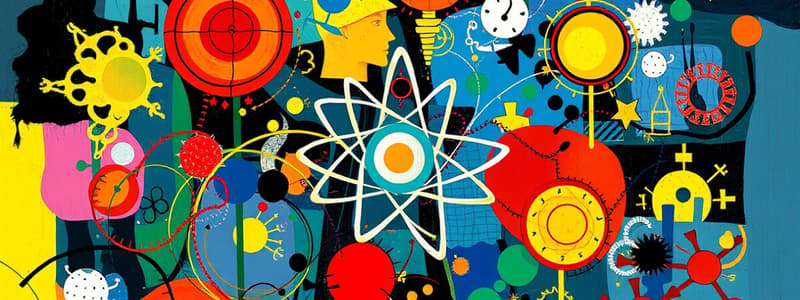Podcast
Questions and Answers
Which branch of science focuses primarily on abstract concepts and includes mathematics?
Which branch of science focuses primarily on abstract concepts and includes mathematics?
- Applied Sciences
- Formal Sciences (correct)
- Natural Sciences
- Social Sciences
What is the correct sequence of steps in the scientific method?
What is the correct sequence of steps in the scientific method?
- Question, Analysis, Hypothesis, Observation
- Observation, Question, Hypothesis, Experimentation (correct)
- Hypothesis, Conclusion, Communication, Analysis
- Experimentation, Analysis, Conclusion, Observation
Which of the following statements best describes a scientific law?
Which of the following statements best describes a scientific law?
- A repeatable statement based on experimental observations (correct)
- An untested hypothesis about observed phenomena
- A theory that explains a natural phenomenon
- A conclusion drawn from peer-reviewed research
Which of the following is not considered a step in the scientific method?
Which of the following is not considered a step in the scientific method?
In the context of an experiment, which term refers to factors that are kept constant?
In the context of an experiment, which term refers to factors that are kept constant?
Which of the following roles does peer review play in the scientific process?
Which of the following roles does peer review play in the scientific process?
Which of the following is NOT a type of variable in an experiment?
Which of the following is NOT a type of variable in an experiment?
What is the primary purpose of using the scientific method in research?
What is the primary purpose of using the scientific method in research?
Study Notes
Definition of Science
- Systematic study of the natural world.
- Involves observation, experimentation, and analysis.
Branches of Science
- Natural Sciences
- Study of natural phenomena.
- Divided into:
- Physics: Study of matter and energy.
- Chemistry: Study of substances and their interactions.
- Biology: Study of living organisms.
- Formal Sciences
- Focus on abstract concepts.
- Includes mathematics, logic, and statistics.
- Social Sciences
- Study of human behavior and societies.
- Includes psychology, sociology, and anthropology.
- Applied Sciences
- Use of scientific knowledge to solve practical problems.
- Includes engineering and medical sciences.
Scientific Method
- Observation: Identifying phenomena.
- Question: Formulating a question based on observations.
- Hypothesis: Proposing a testable explanation.
- Experimentation: Testing the hypothesis through experiments.
- Analysis: Interpreting the data collected.
- Conclusion: Drawing conclusions from the analysis.
- Communication: Sharing findings with the scientific community.
Key Concepts
- Theory: A well-substantiated explanation of an aspect of the natural world.
- Law: A statement based on repeated experimental observations that describe some aspect of the world.
- Variable: Factors that can change in an experiment (dependent, independent, and controlled).
- Peer Review: Process of evaluation by experts in the field before publication.
Importance of Science
- Advances knowledge and technology.
- Informs public policy and decision-making.
- Promotes critical thinking and problem-solving skills.
Definition of Science
- Science is a systematic study aimed at understanding the natural world.
- It relies on observation, experimentation, and analysis to gather knowledge.
Branches of Science
-
Natural Sciences: Focus on natural phenomena.
- Physics: Examines matter and energy interactions.
- Chemistry: Investigates substances and their chemical interactions.
- Biology: Studies living organisms and their processes.
-
Formal Sciences: Concerned with abstract concepts and principles.
- Includes fields such as mathematics, logic, and statistics.
-
Social Sciences: Explore human behavior and societal structures.
- Disciplines include psychology, sociology, and anthropology.
-
Applied Sciences: Utilize scientific knowledge for practical applications.
- Encompasses engineering, medical sciences, and technology-driven fields.
Scientific Method
- Involves a structured approach to inquiry:
- Observation: Identifying and noting specific phenomena.
- Question: Formulating a question arising from the initial observation.
- Hypothesis: Proposing a possible explanation that can be tested.
- Experimentation: Conducting tests to evaluate the hypothesis.
- Analysis: Interpreting and making sense of the collected data.
- Conclusion: Deciding whether the data supports or refutes the hypothesis.
- Communication: Sharing results with the broader scientific community.
Key Concepts
- Theory: A comprehensive explanation based on a body of evidence in the natural world.
- Law: An established principle derived from consistent experimental observations.
- Variable: Elements that may change in an experiment, categorized into dependent, independent, and controlled variables.
- Peer Review: A critical evaluation process by specialists in the same field prior to publication, ensuring quality and credibility.
Importance of Science
- Drives advancements in knowledge and technological innovation.
- Informs public policy decisions and enhances governance.
- Fosters critical thinking, analytical skills, and effective problem-solving capabilities.
Studying That Suits You
Use AI to generate personalized quizzes and flashcards to suit your learning preferences.
Description
Explore the definition of science, its systematic approach, and delve into various branches including natural, formal, social, and applied sciences. Understand the scientific method that guides research and experimentation in these fields.




